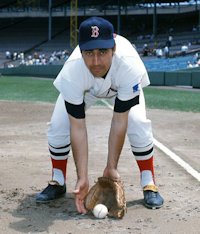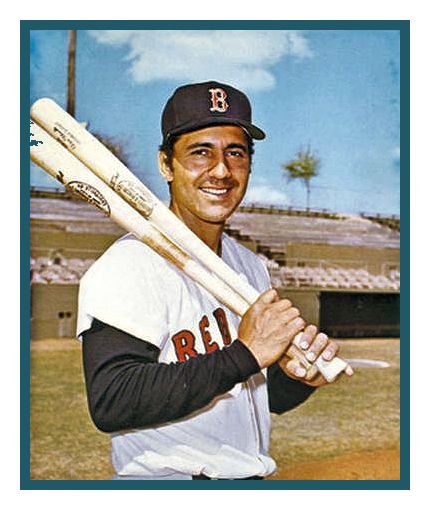|
“FENWAY'S BEST PLAYERS”  |
|||||||
One of the most popular players to ever play for the Boston Red Sox, Rico Petrocelli will always be remembered for his familiar "Fenway Stroke" that sent many an opposing hurler's offerings into the net atop the Green Monster in left field. Although he was not physically imposing at 6-0, 175, he hit 210 lifetime home runs (including a then-league-record for shortstops - 40 in 1969) and his career total of 773 RBIs place him comfortably in the Red Sox top 10 in both categories. A two-time All-Star shortstop and veteran of two World Series with the Red Sox, Rico agreed to move to third base in 1971 to help fill a void in the Boston infield and enable the Red Sox to acquire shortstop Luis Aparicio. His 1976 season was his final one; Rico played in 1,553 regular-season and 17 postseason games in his 12-year career. He still holds the club fielding record for a season at two different positions in the infield, effectively tied for the shortstop mark with Vern Stephens (1950) and Rick Burleson (1980), and at third base as well.
Americo Peter (Rico) Petrocelli was born June 27, 1943 in Brooklyn, NY, the youngest of the seven children born to Attilio and Louise. His father and cousins ran a shop specializing in sharpening tools used in the garment district. Rico developed his love for the game at an early age. At a time when there were three major league
teams in New York, he was inspired by all of the great teams and players. As a youngster he was an avid Yankees fan, with his father taking him to both Yankee Stadium to see Mickey Mantle and the Bronx Bombers and to Ebbets Field to see the Brooklyn Dodgers.
Rico started his professional career in 1962 with Winston-Salem, North Carolina in the Carolina League---batting .277 with 17 home runs and 80 RBI, but struggled in the field at his new position (shortstop), committing a league-high 48 errors. He was promoted to Reading in the Eastern League in 1963 and batted only .239, but he
hit19 homers and drove in 78 runs. The Red Sox brought him to Boston at the close of 1963, and the 20-year-old made his major league debut September 21 in the first game of a doubleheader against the Minnesota Twins at Fenway Park. In a portent of things to come in the future, Rico drove a Lee Stange offering off the fabled Green
Monster for a double in his very first at bat. The hit earned a standing ovation from the sparse crowd (only 6,469 in attendance) and would become one of his favorite memories. In 1967, new Red Sox manager Dick Williams took a different tack with Petrocelli. He brought longtime Red Sox minor league coach Eddie Popowski to Boston as the new third base coach and gave him the locker next to Petrocelli. The good-natured Popowski had managed Rico at both Winston Salem in 1962 and at Reading in 1963, and helped to build the young shortstop's self-esteem with daily pep talks. Williams also helped Petrocelli to mature as a player by giving him the responsibility of being the leader of the club's young infield. Both moves resulted in giving him new-found confidence, and he blossomed as a player. It was Rico's catch of Rich Rollins' pop up that was the final out in Boston's "Impossible Dream" pennant, a catch that would become one of the signature moments in the long history of the franchise. The success of 1967 soon dissipated as a series of injuries doomed the defending American League champions to a fourth place finish in 1968. Petrocelli's batting average plummeted some 25 points as the chronic problem with his right elbow flared, causing him to miss 39 games. Rather than continuing to brood over his misfortune he took on a new positive attitude that winter. He changed his diet and gave up ice cream to help prevent the calcium deposits in his elbow from reforming. He also exercised his arms and wrists in the offseason. By the start of 1969 he felt stronger than at any time in his career, and the results were very evident. He began hitting home runs in bunches while hitting well over .300 for most of the first half of the season. He excelled in the field as well, threatening the record for consecutive games without an error by a shortstop by going 44 straight without a miscue. He would finish the season with a .981 fielding percentage, which remains the record for a Red Sox shortstop.
In July he was the overwhelming choice as the starting shortstop for the American League in the All-Star Game--his second such selection in three years. At the time he was hitting .309 with a remarkable 25 home runs. In the last year prior to the All-Star vote being returned to the fans, he earned more votes from his fellow players,
managers, and coaches than any other player in the league. With the Red Sox out of contention since midsummer, his quest to break the American League record for home runs by a shortstop (39, by the Red Sox own Vern Stephens in 1949) became the big story in September. The record-breaker came on the evening of September 29 against the
Washington Senators' Jim Shellenback at RFK Stadium. He finished the season with 40 homers and 97 RBI while hitting .297. His .589 slugging percentage was second only to Oakland's Reggie Jackson in the American League.
Although his power output dropped significantly in 1972 (only 15 home runs) he continued to drive in runs at a consistent pace, leading the Red Sox with 75 RBI despite hitting only .240. He was especially hot in August, hitting .344 with 23 RBI to help the Red Sox surge into contention for the division title---they would finish a
scant one-half game behind Detroit. He also led the majors in grand slams with three. He would finish his career with a total of nine grand slams, good for second on the Red Sox all-time leader list behind only the great Ted Williams. While Rico's play in the field continued to be above reproach, his lack of productivity at the plate became an issue in 1976. He began suffering reactions to the medication he was taking to correct his inner ear problems and he was forced to discontinue its use. The problems with his balance returned and severely hampered his ability at the plate. He hit a career-low .213 in 1976, and when Don Zimmer took over as manager shortly after the All-Star break he gave rookie Butch Hobson significant playing time at third. Rico was tried briefly at second base, but with little success. In a move that shocked New England, Petrocelli was cut at the end of spring training in 1977, ending his 12-year playing career in Boston. Rico was also one of the early pioneers of the sports talk radio scene in Boston, co-hosting a sports talk show with Glenn Ordway. In 1979 he joined longtime Red Sox broadcaster Ken Coleman in the radio booth as the color commentator. On July 24 he had the privilege of calling former Red Sox teammate Carl Yastrzemski's 400th home run in a game against the Oakland A's at Fenway Park. Petrocelli stayed only one year in the radio booth and after several years in the business word returned to uniform in 1986 as a manager for the Chicago White Sox Single A affiliate in Appleton, WI. His love for the game moved him to accept the position as manager of the Red Sox AAA affiliate in Pawtucket in 1992. That began a six-year stay for him in the Boston organization as a roving instructor. On September 7, 1997, Petrocelli was rewarded for his outstanding Red Sox career when he and four other former players were inducted into the Red Sox Hall of Fame.
|
|||||||

